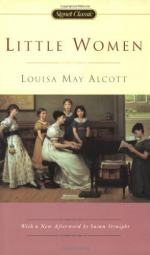What they were to give, neither heard, for both crept into the dark hall, and, sitting on the stairs, held each other close, rejoicing with hearts too full for words. When they went back to be kissed and cuddled by faithful Hannah, they found Beth lying, as she used to do, with her cheek pillowed on her hand, the dreadful pallor gone, and breathing quietly, as if just fallen asleep.
“If Mother would only come now!” said Jo, as the winter night began to wane.
“See,” said Meg, coming up with a white, half-opened rose, “I thought this would hardly be ready to lay in Beth’s hand tomorrow if she—went away from us. But it has blossomed in the night, and now I mean to put it in my vase here, so that when the darling wakes, the first thing she sees will be the little rose, and Mother’s face.”
Never had the sun risen so beautifully, and never had the world seemed so lovely as it did to the heavy eyes of Meg and Jo, as they looked out in the early morning, when their long, sad vigil was done.
“It looks like a fairy world,” said Meg, smiling to herself, as she stood behind the curtain, watching the dazzling sight.
“Hark!” cried Jo, starting to her feet.
Yes, there was a sound of bells at the door below, a cry from Hannah, and then Laurie’s voice saying in a joyful whisper, “Girls, she’s come! She’s come!”
CHAPTER NINETEEN
AMY’S WILL
While these things were happening at home, Amy was having hard times at Aunt March’s. She felt her exile deeply, and for the first time in her life, realized how much she was beloved and petted at home. Aunt March never petted any one; she did not approve of it, but she meant to be kind, for the well-behaved little girl pleased her very much, and Aunt March had a soft place in her old heart for her nephew’s children, though she didn’t think it proper to confess it. She really did her best to make Amy happy, but, dear me, what mistakes she made. Some old people keep young at heart in spite of wrinkles and gray hairs, can sympathize with children’s little cares and joys, make them feel at home, and can hide wise lessons under pleasant plays, giving and receiving friendship in the sweetest way. But Aunt March had not this gift, and she worried Amy very much with her rules and orders, her prim ways, and long, prosy talks. Finding the child more docile and amiable than her sister, the old lady felt it her duty to try and counteract, as far as possible, the bad effects of home freedom and indulgence. So she took Amy by the hand, and taught her as she herself had been taught sixty years ago, a process which carried dismay to Amy’s soul, and made her feel like a fly in the web of a very strict spider.




